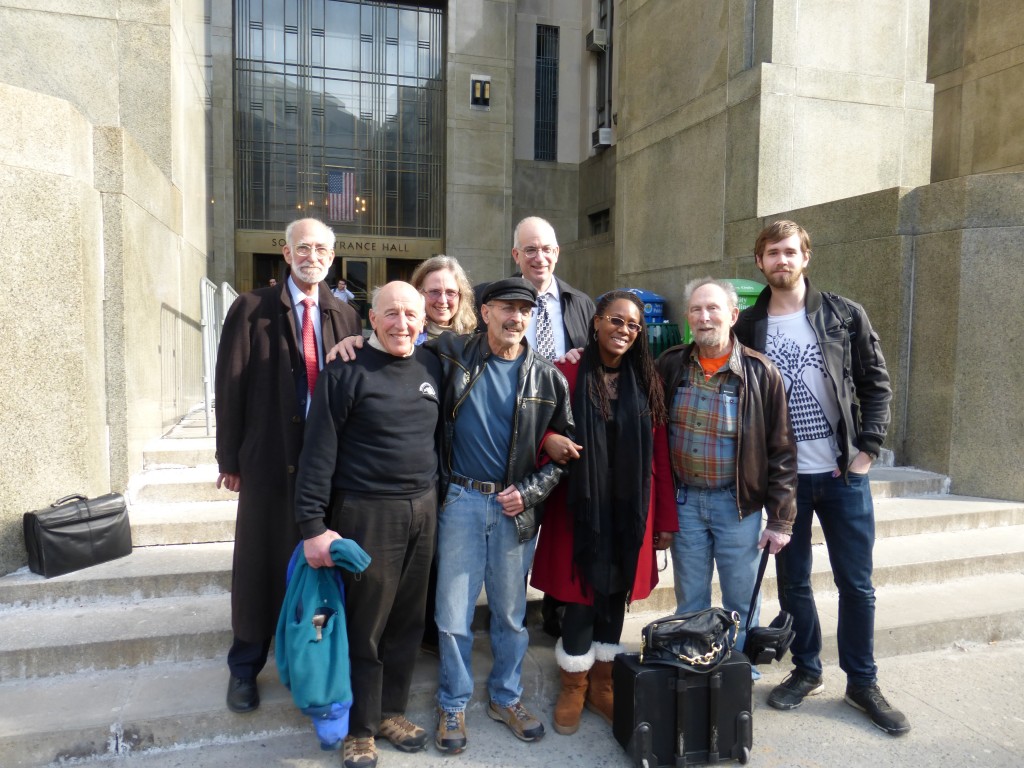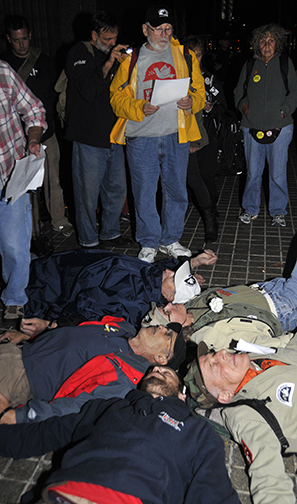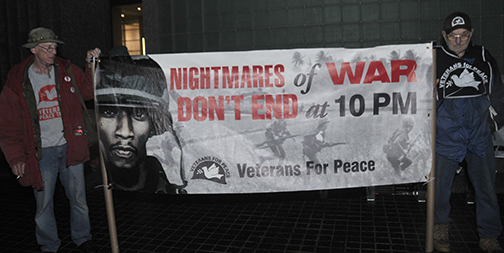
Click for information about Full Disclosure: An Honest Commemoration of the American War in Viet Nam April 26
By Ellen Davidson
Five U.S. military veterans were found guilty March 12 of disorderly conduct, failure to obey a park sign, trespassing, and failure to obey a lawful order for refusing to leave New York City’s Vietnam Veterans Plaza at the 10 pm closing time last October.
“I hope we all understand clearly that we are winning,” said Tarak Kauff, one of the defendants. “Winning is not determined by what a corrupt and pathetic judicial system determines. We, and everyone else in that courtroom, including the judge and prosecution, knew damned well that we advanced the struggle. Why? Because we held our heads high, we didn’t beat around the bush or try to win the case on technicalities—we owned what we did, were adamantly clear about what and why we did what we did.”
The five—Kauff, Ellen Barfield, Ken Mayers, Micah Turner, and Jay Wenk—had flex-cuffed themselves together on the plaza Oct. 7, 2013, as part of a memorial vigil marking 12 years of U.S. war and occupation in Afghanistan. About 50 people had come to read the names of the dead—civilian and military—from U.S. wars in Vietnam, Iraq, and Afghanistan, and to lay flowers at the base of the Vietnam Veterans Memorial. Fourteen others were also arrested for refusing to leave, but their charges were dropped.

Defendants and their legal team in front of the courthouse (left to right): Martin R. Stolar, Ken Mayers, Ellen Barfield, Tarak Kauff, Jonathan Wallae, Patricia Wright, Jay Wenk, Micah Turner. Photo by ELLEN DAVIDSON
The veterans’ defense, presented by National Lawyers Guild attorneys Martin S. Stolar, Jonathan Wallace, and Patricia Wright, was that they were protected by the First Amendment and that the city had to present a “significant government interest” in shutting down a free speech. In his closing statement, Wallace pointed out the city not only failed to present any such compelling interest, but in fact was not really interested in closing the plaza at 10 pm. He noted that there are no barricades placed at the closing, that the two signs announcing the closure are not even visible from most entrances to the park (one sign is about 100 feet inside the actual entrance), and that most people using the park after 10 pm (dog walkers, workers at the adjoining office buildings, tourists, visitors to the memorial) are not disturbed by police or security from the adjacent building at 55 Water Street. In fact, he pointed out, the only time the city enforces the 10 pm closing time is when people are there engaging in First Amendment activities.
Attorney Stolar argued in his closing statement that international laws protecting free speech also required compelling government reasons to shut down activities such as the veterans’ vigil. He also cited the nature of the memorial itself as inviting passersby to come in and do exactly what the veterans and their allies were doing. He quoted an excerpt from a soldier’s letter etched on the memorial wall: “One thing worries me… will people believe me? Will they want to hear about it, or will they want to forget the whole thing ever happened?” “Reading the names of the dead at a memorial—what could be more appropriate?” Stolar asked.
Stolar ended his closing by quoting another letter on the memorial wall, from a soldier killed in action in 1970: “‘And in that time when men decide and feel safe to call the war insane, take one moment to embrace those gentle heroes you left behind.’ That’s what these folks did. They called the war insane, but they took the moment to embrace those gentle heroes that they left behind.”

Veteran John Spitzberg reads the names of the war dead while the defendants lie flex-cuffed together on the ground. Photo by ELLEN DAVIDSON
“Your honor, here before you we have five brave soldiers,” said attorney Patricia Wright in her closing. “They stand before you as veterans of military actions from World War II to the invasions of Afghanistan and Iraq. When they entered the service they swore to uphold the Constitution of the United States of America and the inalienable rights that it bestows upon all American citizens. They stand before you as staunch and fierce supporters of those rights and they continue to fight on U.S. soil to uphold them.”
Wright continued: “On October 7, 2013, that U.S. battleground was the Vietnam Veterans Memorial outside of 55 Water Street. Their weapons were peace and the First Amendment.”
“When I think about the sacrifices that these people have made and continue to make for my freedom, for all of our freedoms,” said Wright, “I think about how proud I am. I think about how frightened I am that there are so many unjust laws in place that have served to erode my ability to be free. At the beginning of this trial, you heard the prosecution state that the defendants were ‘determined to break the law.’ But what they told you was that they were actually fighting to uphold the supreme law of this land, the Constitution of the United States.”
The five were originally also charged resisting arrest and obstructing government administration, charges that carry a jail sentence of up to a year and guarantee the defendants a jury trial. At the last minute, Assistant District Attorney Anthony Amanoff dropped these two charges, leaving the veterans with a bench trial before Judge Kevin McGrath. In a sentencing statement, Jay Wenk, a World War II infantrayman, expressed his disappointment: “Whoever it was in the prosecutor’s office that denied us a jury trial in my opinion has put a stain on the noble profession. I presume as a layperson that every person associated with the functioning of the law is interested in justice, and in my opinion we have been denied justice because we were denied a jury trial. I respect your honor’s work in terms of providing justice under the law, and I believe that [this particular] law is unjust, and that a jury trial would have provided justice and my belief is that the prosecutor’s office knew that they would lose with a jury trial.”
Kauff was also disappointed in the judge’s decision. He made an impassioned sentencing statement indicting the city’s decision to arrest veterans for engaging in free speech at a veterans memorial:
“Your honor, this is the third time that I have been arrested at the veterans memorial. The first time was in an attempt to dissuade any potential police violence on the Occupy movement, which was there holding an extremely peaceful and beautiful general assembly at the Vietnam Veterans Memorial. This to me was something you would want to see in a democracy, you would want to encourage it. And at this place it was perfect, it did not disturb the peace, it did not inconvenience anyone.
“The second time was on October 7, again, the anniversary of the horrific Afghanistan war, and we were there for the same purposes we were there for this last time, and I remember speaking to the captain that time. We had a cordial conversation, and she also asked me, is it our intention to be arrested, and I also answered her no, that is not our intention. She said, ‘I can give you another two or three hours past 10 o’clock.’ What? You could do that? You can make that decision? She said, ‘Yeah, if you can guarantee me that you’ll be done by that time.’ I said, ‘I can’t guarantee that, and that’s not our purpose here, to make a deal with you.’ She says, ‘Look, I can’t let you stay here all night’—now hear this—’because it would set a bad example for the Occupy movement.’ What?! In other words, you would like to let us stay here all night, because you don’t want to arrest veterans, your officers don’t like arresting veterans, in fact many of them voiced their disgust to us, but you were willing to make an exception, but you don’t want to set an example for the Occupy movement. And you call that correct enforcement of the law? And you call this correct? It’s absurd! It’s absolutely absurd.
There are people who died that at that memorial that we are remembering, and there are people who go to that memorial in the early hours of the morning because they can’t go any other time, because that’s when the memories come out, because that’s what they suffered in Vietnam, and you are not allowing veterans at their own memorial. This is not justice. I’m sorry, I respect you, your honor, but this is not justice!”
The veterans received a sentence of “conditional release”: If they get arrested again in the next year, the district attorney’s office has the option of reopening the sentencing in the case. They also have to pay a $200 “surcharge” to the crime victims’ fund. A supporter has already offered to pay the surcharge. The veterans have vowed to keep returning to the memorial to assert their First Amendment rights, and they plan to appeal this decision.
Report on first day of the trial: Veterans’ Free Speech Trial Opens March 10
Report on second day of the trial: Veterans Take the Stand

